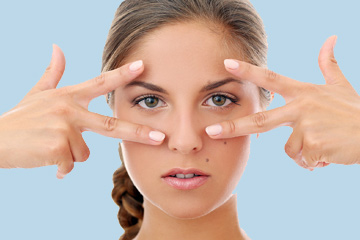Most people spend a lot of time outdoors in summer. Along with skin care, you need to take care of your eyes too. Harmful UV rays in the sunlight can not only affect your skin but also damage your eyes. It can cause the cornea to become inflamed, leading to the formation of cataracts, macular degeneration or pterygium–tissue growth on the surface of the eye. Such conditions can impair vision. Unfiltered UV light or prolonged exposure to UV rays can also cause sunburn of the eyes or a very painful condition called photokeratitis.
Here are some key tips to protect your eyes against the summer sun.
Wear Sunglasses when you’re Outdoors
Remember that sunglasses are as important as sunscreen during summer. Sunglasses are a vital component of summer eye protection. Always wear sunglasses when you’re outdoors, even if it’s for a few minutes. Along with keeping your eyes more comfortable, sunglasses can prevent headaches, migraines, blurry vision, and other secondary effects of overstrained eyes. A good pair of sunglass can reduce the amount of sunlight glare, which reduces eye pain. Make sure to choose a pair of sunglasses with lenses that can block at least 98% of ultraviolet radiation.
Watch for Summer Allergies
As your eyes are especially sensitive to all kinds of infections, never ignore any summer allergies like itchy, red or watery eyes, as it can be a symptom of eye allergies or allergic conjunctivitis, a condition that affects millions of Americans. Certain eye allergies trigger include outdoor allergens (pollens from grass, trees and weeds), indoor allergens (pet dander, dust mites and mold) or irritants (cigarette smoke, perfume and diesel exhaust). Rubbing eyes too hard or too frequently can also worsen the effect of allergies, and even damage the eyes by causing conjunctivitis. Blink your eyes more often – this is the body’s natural way of keeping eyes moist and safe. Some symptoms of eye allergies can be controlled with artificial tears, decongestant eye drops or other non-prescription medications. If dryness or irritation in the eyes persists, consider consulting an allergist.
Wear a Hat
Regular use of hats and sunglasses significantly decrease UVR exposure. During summer, make sure to limit your time outdoors when the sun is at its strongest, mainly during the peak hours. Consider wearing a hat with a brim that is at least 3 inches wide, which helps to protect your eyes against UV rays.
Wear Goggles when you Swim
Just like sunglasses, goggles are also important. Water exposure can damage unprotected eyes. Chemicals like chlorine used to keep the water clean in pools can affect the natural tear film, which is meant to keeps our eyes moist and healthy. Whether you are swimming in the ocean or in other natural water bodies, make sure to wear goggles every time to protect your eyes against contaminants.
Remove your Contact Lens before Getting in Water
Remember to remove your contact lens before swimming. There are chances that bacteria and other micro-organisms can attach to the contact lens surface or can get trapped between the glass and eyes, which can cause dangerous eye infections.
Watch your Diet and Stay Hydrated
You may be surprised to learn that what you eat has the power to affect how well you see. It’s not just carrots. To improve eyesight and help prevent any long-term vision problems, make sure to eat foods that are rich in nutrients. Include foods that are rich in Vitamin C, Vitamin E and zinc. It is equally important to drink enough water, as dehydration makes it difficult for the body to produce tears, which can worsen the symptoms of dry eye and other vision concerns.
